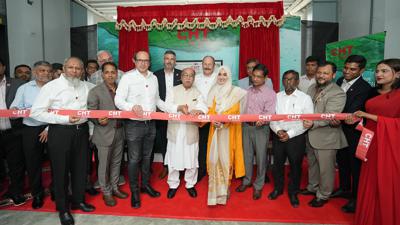
Reducing the carbon footprint is in the focus of a collaboration between CHT and Fulgar with an effective and sustainable solution for the textile market.
Combining Fulgar’s circular economy ready yarns with CHT’s resource-saving dyeing techniques significantly reduces the usage of natural resources and leads to lower environmental impact and ultimately a lower carbon footprint. The combined process needs less water, uses less energy, and saves time while meeting the color fastness standards for finished textile products.
The combination of 100% bio-based polyamide Evo by Fulgar yarns with CHT sustainable dyeing application can save water up to 64%, energy use up to 50% and process time up to 50%, when compared to standard dyeing processes. Sustainable dyeing of Evo is promoted using CHT’s soy-based dyeing auxiliary Sarabid TS 300. Sarabid TS 300 has accredited a C2C Certified Material Health Certificate at Gold level and USDA Certified Biobased Product Certification.
Evo, the totally renewable yarn based on castor plants from Fulgar SpA, Castel Goffredo/Italy, does not require high amounts of water - 4 times less compared to cotton. In addition to the sustainable aspect, the fiber offers characteristics like lower fiber weight, particular moisture management and higher stretch often without the need for elastomer fiber. This helps to avoid material mixes for better recycling opportunities. Evo provides greater user comfort, mainly for performance and casual apparel.
Another fiber option is Q-Cycle by Fulgar, a 100% recycled mass-balanced PA fiber, produced without virgin crude oil raw materials. Up to 50% of CO2 equivalents can be saved throughout the yarn production process. Q-Cycle yarns and fabrics dyed with Sustainable Solutions from CHT Group, Tübingen/Germany, can save up to 32% of water usage, up to 33% of energy consumption and shorten the process time up to 36%. The dyeing process is carried out using the Sarabid IPD. This product helps in achieving the best leveling results in combination with the aftertreatment using PAFIX LBS, an anionic fixing agent containing low bisphenol S. Both auxiliaries in combination with Q-Cycle will deliver the same level of quality, performance, and comfort as products made out conventional polyamide.
No dyeing without suitable dyestuff – the system can be completed with CHT’s selected Bemacid dyes rated with a C2C MHC on the Gold level.
Evo, Q-Cycle = registered trademarks



